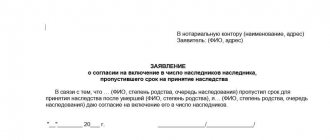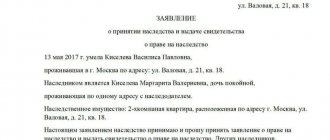Definition
The term for entering into an inheritance is understood as a strictly defined period of time during which all heirs must declare their rights to the inheritance mass ( Article 1154 of the Civil Code of the Russian Federation ).
Legal features of inheritance:
- is imperative in nature (cannot be changed either by the notary or the heirs);
- missing the inheritance period cancels the powers of the heirs;
- the missed deadline is subject to restoration only in exceptional cases;
- can be extended only on the basis of a court decision.
Our next steps
The steps a citizen takes when receiving a positive or negative court decision are slightly different. In some cases, going to court is not required.
With a positive court decision
As a result, the previous certificates will be canceled, and the process of dividing the property of the deceased will begin anew. With all the necessary documents, they again turn to the notary. Based on his resolution, changes are made to the record of state registration of movable and immovable property subject to mandatory registration.
When deciding an heir unworthy of restoration
Courts of general jurisdiction deal with such issues. If the restoration of inheritance rights is refused, the potential heir may file an appeal to a higher court.
What are the general terms of inheritance?
The law specifies a single period for acquiring rights to an inheritance share, which is equal to six months . Its observance is mandatory for each of the called heirs.
Dear readers! The article talks about typical ways to resolve legal issues, but each case is individual. If you want to find out how to solve your particular problem , contact a consultant:
+7 (499) 938-81-90 (Moscow)
+7 (812) 467-32-77 (Saint Petersburg)
8 (800) 301-79-36 (Regions)
APPLICATIONS AND CALLS ARE ACCEPTED 24/7 and 7 days a week.
It's fast and FREE !
Peculiarities:
- the expiration of the period occurs on the next day after the death of the testator is declared;
- if the moment of death of the owner of the property is unknown (missing), the period begins to expire from the date of entry into force of the court decision declaring him dead ( clause 1 of Article 1114 of the Civil Code of the Russian Federation );
- the day of death of the will-maker is the day of opening the inheritance case ( Article 1113 of the Civil Code of the Russian Federation );
- Before the expiration of the six-month period, the heirs cannot be considered the new owners of the property.
The period for entering into inheritance may exceed 6 months if we are talking about hereditary transmission. The law indicates the possibility of extending the general inheritance period if, after the death of the main candidate, his successor (descendant in the descending line of kinship) has less than 3 months . The specified entity is additionally given 3 months to sell the transmission ( paragraph 2, paragraph 2, article 1156 of the Civil Code of the Russian Federation ).
Law enforcement practice knows cases when the period for entering into inheritance is suspended.
This is due to:
- adoption of an appropriate court decision;
- identification of the fact of conception of the testator’s child (the period will be suspended until the birth of the candidate).
Failure to comply with the requirements regarding the timing of entry into inheritance rights entails their cancellation and loss of the right itself.
However, the legal regulations allow cases of restoration of the missed period if it is proven (Article 1153 of the Civil Code of the Russian Federation):
- grounds allowing to judge the acceptance of the inheritance share by performing actual actions;
- valid reasons for absence.
What to do when a period is missed, how to restore an inheritance
An inheritance certificate previously issued by a notary will be cancelled, but first you need to prove your right to part of the deceased’s property. This can be done in several ways:
- voluntary consent of the remaining heirs;
- actual acceptance;
- trial.
Important! If the direct recipient dies before accepting the inheritance, his share is transferred to his successors through his line (by will or law). The period is extended for another 3 months, provided that less than half is left before the expiration of 6 months. Otherwise there will be no extension.
What reasons are considered valid?
The following are considered valid reasons for not contacting a notary on time:
- Serious illness - it is necessary to submit a certificate from the medical institution where the citizen was staying.
- Military service, in the absence of the opportunity to leave the military unit for a long time - a document from the military registration and enlistment office as confirmation.
- Living abroad - without justification for the inability to travel outside the borders of the place of residence, the reason will not be considered valid.
- The possible heir was not notified of the death of a relative (about the fact of family ties) (not to be confused with legal literacy) - it is necessary to prove that they did not communicate for a long time, did not know about the inheritance and the last place of residence of the testator.
- Long-term work trip – proof will be documents from the employer.
- Lack of information about the will in his favor.
- Illiteracy of the heir.
- Serving a prison sentence.
Without a good reason, it is impossible to restore the rights to the property of the deceased even in court.
Know! The notary can be called to the hospital; therefore, if the applicant does not do this, being in the hospital will not be counted as a valid reason.
Restorative order
A fairly simple way to become one of the legal successors is to obtain consent from the others, it must be voluntary. The signatures of the current heirs are certified by a notary/person authorized to certify documents. Certification is not required if the consent was drawn up in the presence of a notary.
Remember! Consent must be made in writing, otherwise it loses legal force.
Judicial
If it was not possible to obtain consent to allocate a share of the inheritance mass with other heirs or there is only one applicant (there are no other heirs), restoration of the missed period is possible only in court. The statement of claim must be filed at the location of the notary office where the inheritance case is opened, and the following should be attached to it:
- death certificate of the testator;
- a will (if available) or documents confirming the right of inheritance (birth certificate, marriage certificate, certificate of incapacity, etc.);
- refusal to accept an application from a notary;
- justification for good reasons - facts that the deadline was missed for reasons independent of the citizen.
In court, you will have to prove your right to enter into an inheritance and the ownership of the inherited property by the deceased. Every word of the new applicant will be disputed by other participants in the process. If there are no other heirs, the opponent is the Federal Tax Service or the local administration. If the grounds for missing the deadline for trial do not seem sufficiently respectful, you can obtain the property of the deceased in two ways:
- Agree with the other receivers and get their consent.
- Actual acceptance.
By taking upon himself the obligation to preserve and ensure the property of the testator in the first six months after his death, a person actually enters into an inheritance. It is easier to prove this fact in court than to reinstate missed deadlines without good reason.
Important! You can become the owner of the property of the deceased after the expiration of the period within 6 months after the reasons for the omission have ceased. After this time, nothing can be done. The exception is actual acceptance.
Causes
Not all reasons are considered by the court as worthy of restoring the time limit for entering into inheritance.
Respectful
Valid reasons are circumstances that deserve attention due to the fact that the subject on whom they influence cannot overcome them or stop their action at their own request and at once.
The law equates the following as valid reasons:
- illiteracy of the heir;
- stay in places of detention;
- stay on a long business trip or expedition;
- long-term illness or hospital treatment;
- physical helplessness;
- restriction of legal capacity or deprivation thereof (mental disorder, failure to reach the age limit);
- lack of awareness of the death of the testator.
It is important to understand that the above circumstances must be confirmed by relevant documents, including:
- official order about sending on a business trip;
- certificates from a medical hospital;
- discharge summaries;
- court decision to impose a sentence of imprisonment;
- testimony collected to prove the illiteracy of the heir or his lack of contact with other relatives, the testator himself;
- audio and video recordings confirming the helpless state.
Disrespectful
The law does not contain information about what reasons can be classified as disrespectful. On this basis, the interested party should still challenge the missed deadline, since the court will assess the reasons for failure to comply with the deadline on an individual basis.
If unfounded arguments are given in favor of missing the deadline, to which the court does not attach importance, the heir will no longer be able to become the legal holder of the share due to him.
What is contractual inheritance?
Another opportunity to restore the right to accept an inheritance after a few years is through contractual entry. One option for a late heir is to turn to other heirs. If they agree to restore the period for accepting the inheritance and include the latecomer among the heirs, then he will be able to receive his share. This nuance is spelled out in Article 1155 of the Civil Code of the Russian Federation.
The late successor must draw up a paper with evidence of the existence of his rights to the inheritance, as well as a request to return him to the circle of applicants. Such a document must be sent to each of the heirs. If all successors agree, the notary will draw up an additional agreement to allocate a share of the inheritance to the late successor.
If all the successors are against restoring the deadlines for the late heir, then he needs to go to court with a corresponding claim.
If the successor manages to obtain a formal agreement from all successors to restore his rights to the inheritance, the notary will redistribute the property.
In practice, the late heir receives that part of the property that remains undivided. If there is no such part, then the late applicant will be allocated the inheritance by reducing the share of other successors. If the heirs managed to sell their received property, the court may establish compensation that they will have to pay to the new successor. Facebook
Restoring a missed deadline
Sometimes it is possible to restore the term without going to court.
At the notary
The restoration of the term by the notary is conciliatory in nature, that is, the procedure is carried out upon receipt of permission from the remaining called heirs ( Clause 2 of Article 1155 of the Civil Code of the Russian Federation ).
Peculiarities:
- consent must be obtained from each of the heirs (the procedure is not feasible if at least one of the successors does not give consent);
A sample is presented here.
- The document must be prepared in writing;
- the consent must be drawn up in an individual document for each heir and contain a direct indication of the voluntariness of the decision, its signature and the date of preparation;
- the consent of other heirs must be carried out in the presence of a notary, in whose jurisdiction the inheritance case is located, or in the presence of other witnesses (not limited by law to perform such events).
A conciliatory procedure for restoring the term is unacceptable (only judicial procedure is used) if:
- only one heir is called to inherit;
- the deadline was missed by each of the heirs.
Step-by-step algorithm for the conciliation procedure:
- gathering of heirs at the notary’s office or accompanying the meeting with other witnesses;
- notarial explanation of the consequences of issuing consent (cancellation of a previously issued certificate, reduction or deprivation of a share);
- obtaining written consent from all heirs;
- filing an application for restoration of the period for the heir to assume the powers;
An example can be seen here.
- provision of necessary documents by the heir who missed the deadline;
- cancellation of previously issued certificates of inheritance;
- redistribution of shares;
- issuance of new certificates.
Do you want to understand how to assess the value of property when receiving an inheritance? See the article about this: valuation of a car for inheritance. Don’t know when you can sell an apartment you inherited? Read about it here.
Through the court
If it is impossible to resolve a dispute through a notary, or the heirs refuse to give consent to restore the term, the interested person has the right to appeal to the courts ( clause 1 of Article 1155 of the Civil Code of the Russian Federation ).
It is important to understand that the case will be considered only after filing a statement of claim. The document is presented here.
Other entities called upon to inherit may be brought in as defendants, and a notary as a third party.
One of the attachments to the claim will be a document confirming the notary’s refusal to accept the application to become an heir.
One of the following facts must be proven in court:
• the inheritance was accepted by performing actual actions ( clause 2 of Article 1153 of the Civil Code of the Russian Federation ):
- repayment of the testator's debt arising from the inheritance share;
- the heir continued to live in the inherited apartment;
- inherited property is leased to successors;
- the subject of the inheritance was significantly improved at the expense of the heir;
- the heir makes mandatory payments in relation to the bequeathed property (utility and tax burden);
- the heir took actions to preserve the hereditary mass from the encroachments of third parties and ensured its proper condition;
• the reason for missing the deadline was due to valid life circumstances ( clause 1 of Article 1155 of the Civil Code of the Russian Federation ).
What to do if there is no longer any inherited property
If the heir went to court late and no measures were taken to secure the claim, the property may no longer exist. Citizens who have received a certificate of inheritance, after registering ownership of the property, can dispose of it at their own discretion: use it for personal purposes, donate it, sell it. If the property was sold, the new heir has the right to receive monetary compensation. Each heir reimburses an amount equal to the value of the inherited part, which was determined at the time of opening the inheritance case. In case of restoration of terms by agreement between the heirs, the same principle applies, unless otherwise provided by the agreement.
Forensic method
If you cannot reach an agreement with your relatives, you will have to write a statement to the court.
Jurisdiction
A claim to restore the deadline for entering into an inheritance must be filed with the district court at the place of residence of the defendants ( Articles 24, 28 of the Code of Civil Procedure of the Russian Federation ).
In this case, all heirs who have already assumed their rights will act as defendants.
In their absence (if only one heir or all of those called upon missed the deadline for entry) - to the district court at the location of the estate or registration of the testamentary act.
Statement
The claim for restoration of the heir's authority does not have a strictly established form, therefore its content should be similar to the application drawn up for a notary and reflect the following data:
1. name of the body subordinate to consider the issue; 2. information about the plaintiff (full name, residential address, contacts, index); 3. information about the defendant (they may be other citizens, organizations, municipalities, the Russian Federation); 4. information about third parties (notary conducting the inheritance case); 5. name of the document (on restoring the deadline for accepting an inheritance); 6. description of the circumstances:
- the moment of death of the testator;
- date of opening of inheritance;
- reasons for missing the deadline.
7. an indication of the request for an extension of time; 8. list of supporting documents (including those that confirm valid circumstances of failure to meet the deadline); 9. date, signature of the applicant.
An example can be seen here.
Documentation
1. Application (the number of copies must correspond to the number of participants in the process, taking into account the judicial authority). 2. Documents confirming entitlement to the inheritance share:
- heir's passport;
- will (if any);
The document can be viewed here.
- a document confirming family ties with the testator (in the absence of a will);
- certificate of the last place of registration of the owner of the estate;
- a certificate of the value of the property (will be necessary not only to calculate the notary fee, but also the state duty);
- title documents for inherited property.
3. Certificates, memos, acts confirming valid reasons for missing a deadline; 4. Receipt confirming payment of the fee; 5. A document confirming the preferential category of citizens (if the subject is exempt from paying duties or has a discount).
State duty
The amount of the state duty depends on the price of the claim, the size of which will be determined based on the value of the inherited share ( Article 333.19 of the Tax Code of the Russian Federation ).
The value of the share can be determined based on:
- an act on the assessment of property carried out by a special expert or bureau operating under a license;
- certificate from the BTI (issued only for real estate).
The Tax Code provides limits according to which the amount of the duty cannot be less than 400 and no more than 60,000 rubles .
Don't know what package of documents you need to collect to receive an inheritance? Read about this in the article: what documents are needed for an apartment to inherit. About what tax you will have to pay on the sale of an apartment received by inheritance is written here.
Details about the documents for registering ownership of an apartment by inheritance are described here.
Consideration of the case
The legal process for the restoration of the inheritance period takes place in the following order:
- acceptance of documents by the court office;
- checking the jurisdiction and completeness of the package of documents;
- drawing up a resolution to accept the case for proceedings;
- sending notification of the commencement of legal proceedings to the remaining participants in the process;
- scheduling a court hearing;
- sending a request to the notary office handling the inheritance case;
- consideration of the case on the merits: investigation of the reasons for missing the deadline and clarification of the relevance of the circumstances that deserve attention on the subject of the claim;
- adjudication.
By its decision, the court can (Article 1155 of the Civil Code of the Russian Federation):
- fail to satisfy the stated requirements;
- restore the missed deadline;
- redistribute shares and property;
- provide measures to protect the inheritance rights of the new successor.
If the outcome of the case is positive, the following consequences occur (paragraph 2, paragraph 2, article 1155 of the Civil Code of the Russian Federation):
- previously issued certificates are invalidated;
- the heir restored to his rights must again apply to the notary within 6 months;
- heirs who previously accepted their shares must return the property or pay compensation to the reinstated heir;
- the notary will issue certificates that will reflect the new shares of the heirs;
- making adjustments to the state register of property rights.
Actual acceptance of inheritance
The inheritance is considered accepted, despite failure to receive a certificate from a notary, if the citizen:
- Begins to use the property (lives in the house, uses household items, etc.).
- Provides property security (installed a new lock, alarm system, etc.).
- Spends his own funds on caring for the property (repairs the car, pays for housing and communal services, taxes, etc.).
- Pays the debts of the deceased using personal funds.
These circumstances require documentary evidence, in particular, submission of:
- Certificates from housing and communal services or other authorized bodies about the place of residence of the heir.
- Receipts for payment of utilities, taxes, and loan payments.
- Contracts for home and car repairs.
- Certificates from authorized bodies confirming that the property is in use.
- Testimony of witnesses.
In this case, the citizen is not considered to have missed the deadline and does not need to restore it through the court. At any time he has the right to obtain a certificate from a notary office.
But if the notary employee considers that the evidence is insufficient, the certificate cannot be issued, and it will be necessary to establish through the court the fact of acceptance of the inheritance.






